#Masha Gessen
Text
Supporters of Masha Gessen, who is Jewish, and whose grandfather and great-grandfather were among family members murdered by the Nazis, have been quick to point out the irony of suspending a prize awarded in memory of Arendt, the German-born Jewish-American historian, philosopher and antitotalitarian political theorist who coined the phrase “the banality of evil”, in connection with the trial of leading Nazi Adolf Eichmann, which she covered as a journalist for the New Yorker.
#Masha Gessen#Heinrich Böll Foundation#german fear and guilty#german awards journalist canceled 2023#Palestine#Gaza genocide#Germany's Hannah Arendt Prize 2023
3K notes
·
View notes
Text
The essay that got Masha Gessen’s Hanna Arendt prize revoked. It is very good and you should read it.
93 notes
·
View notes
Text

crylaughing at how accurate this is.
#this probably won't make sense to anyone on my dash but. yeah#current events#masha gessen#germany will see an opportunity to overcorrect for ww2 by doing the stupidest thing possible and not even stop to think about it ✌️
119 notes
·
View notes
Text
“When I was a teenager and my family emigrated from the Soviet Union, basically we were waiting outside of Rome for our papers to come to the United States. And there was a Rabbi who would give Torah lessons to kids of these Jewish refugees waiting for their papers. Now, for most of us, this was the first Jewish education that we ever received because this was illegal in the Soviet Union, which was part of the impetus for some of our families leaving.
I was a Jew on my passport, not a Russian.
I was a Jew in my passport, in my school file, in my parents’ personnel files, my medical records. Everywhere you went, you were marked as a Jew. And yet, you could not have any Jewish education.
You could not practice Judaism or study Hebrew. And so, my very first Torah lesson took place when I was 14. And it was on Amalek, which was a people that set out to destroy the Hebrews.
The way that the Rabbi taught it, which is a very common way, was that every generation of Jews has its own Amalek to destroy us. And the only way to survive is to destroy Amalek ourselves. And, you know, that spoke to me when I was 14.
It gave a framework to what I had experienced, both as a kid growing up in the shadow of the Holocaust and a kid growing up with this really pervasive, [Russian] state-enforced antisemitism. But this is also the legend that Netanyahu and other Israeli officials have been wielding to justify the indiscriminate destruction of Gaza. That second part of the legend of Amalek, that you have to kill the seed of Amalek, is a biblical quote, being used now in the International Court of Justice by the South African lawyers to make their case that there is clear genocidal intent.
It's so crazy making, but also so familiar. And I think even 43 years later, I remember how comforting it was to fall into a sense of communal victimhood. Israel is the victim of October 7th and will be the victim of October 7th for a long time to come.
But people can be victims and perpetrators at the same time. This is actually one of the other great lessons of the 20th century. Israel was the victim of a horrific attack and a horrific series of crimes against humanity, and is at the same time now committing crimes against humanity.”
—Masha Gessen, staff writer at The New Yorker and author of, In the Shadow of the Holocaust
#politics#palestine#gaza#israel#masha gessen#amalek#war crimes#crimes against humanity#in the shadow of the holocaust#ethnic cleansing#israel is a terrorist state#collective punishment#🇵🇸#antisemitism#russian fascism ☭#anti zionism ≠ antisemitism#genocidal intent
39 notes
·
View notes
Text
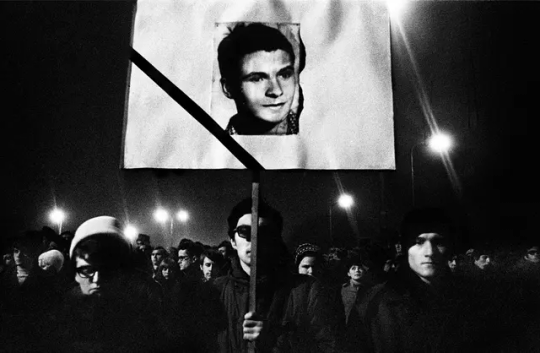
Josef Koudelka made surreptitious photos of the Soviet invasion of Czechoslovakia in 1968, which were smuggled out of the country. This image from January 1969 is of a public mourning of the death of Jan Palach, a 21-year-old student who set himself on fire in the center of Prague. It is crushing af to see this now in the wake of Aaron Bushnell's own self-immolation, in my country, not far from my house.
image: josef koudelka/magnum via newyorker.com
41 notes
·
View notes
Text

#masha gessen#zombie#società#società malata#violenza#gaza#guerra#propaganda#bambini#genocidio#schiavi#dittatura#politica#diavoli#svegliatevi#aprite gli occhi#sistema#matrix#responsabilità#verità
14 notes
·
View notes
Text
by Phyllis Chesler
Both Butler and Gessen seem to revere Jewish vulnerability, statelessness and martyrdom. Are they also Nazis in drag?
The two conformists see Jewish vulnerability to persecution as far more “ethical” than the Jews’ ability to defend themselves from persecution and genocide. According to Prof. Corinne Blackmer in her brave book Queering Anti-Zionism: Academic Freedom, LGBTQ Intellectuals and Israel/Palestine Campus Activism:
“Butler implicitly argues that Jews were better off suffering rather than perpetrating state-sponsored persecution. … Two possible lessons or conclusions can be drawn from the fact that Jews experienced considerable state-sponsored violence, persecution and discrimination in the galut [exile], culminating not only in the Holocaust but also the forced removal of nearly one million Mizrachi Jews from their ancestral homes in the Middle East before or during the establishment of Israel as a Jewish state in 1948. One, supported by Butler and other BDS advocates, states that precisely because Jews suffered extreme state-sponsored violence, they should endeavor to avoid state-building, although this formulation leaves unanswered precisely under what political system Jews should (peacefully?) reside.”
In her piece in The London Review of Books, Butler does “condemn without qualification the violence committed by Hamas. This was a terrifying and revolting massacre. This was my primary reaction, and it endures.”
However, she then goes on to “contextualize” this statement by trotting out all manner of false allegations against Israel: “We should develop some understanding of why groups like Hamas gained strength in light of the broken promises of Oslo and the ‘state of death, both slow and sudden’ that describes the lived existence of many Palestinians living under occupation, whether the constant surveillance and threat of administrative detention without due process or the intensifying siege that denies Gazans medication, food and water.”
Butler appears to be either ignorant of or deliberately concealing several important facts: Israel left Gaza in 2005. Hamas—an Iranian-funded Islamist terror group—controls, indoctrinates, tortures, torments and impoverishes Gazans. Hamas has taken the lion’s share of the aid meant for Gaza civilians and diverted it into their own bank accounts abroad and into building their terror tunnels and weaponry. No Arab country has been willing to offer Gazans refuge, even temporarily. Egypt has walled off Gaza from the Sinai. Hamas has increasingly forced women to wear veils, marry into polygamous families and risk being honor-killed if they “shame” their families.
14 notes
·
View notes
Text

Alexey Nalvalny’s birthday message to his wife, Yulia, in July 2023. (As recounted by Masha Gessen in the New Yorker today 2/16/2024.)
9 notes
·
View notes
Text
Art, Culture, Censorship, and Palestine
I'm late in posting this, but from Democracy Now, interviews with three important cultural workers, an artist and two writers, who are being censored. Samia Halaby, Marione Ingram, and Masha Gessen.
youtube
"We spend the hour looking at how artists, writers and other cultural workers in the United States and Europe are facing a growing backlash after expressing solidarity for Palestine. We begin with one of these "canceled" cultural workers: renowned Palestinian American artist Samia Halaby, whose first U.S. retrospective was canceled by her graduate alma mater, Indiana University, after she criticized Israel's bombardment of Gaza. The school’s provost said this week the show would have been a "lightning rod" that carried a "risk of violence." Halaby expresses her shock and disappointment at the betrayal of "academic freedom" evidenced by the decision. "The administration has lost sight of their responsibility to the community, to the students that are there," she says, and adds, "This is much larger than I am," citing the suppression of pro-Palestine student activism around the country and calling it "a kind of attempt at mind control.""
youtube
"We are joined by 88-year-old Jewish German American Marione Ingram, who describes how her scheduled speaking tour in Hamburg -- the city she fled in the Holocaust -- was "postponed" this month amid a wider backlash against those speaking out against Israel's assault on Gaza. Ingram has been protesting for months outside the White House calling for a ceasefire, and characterizes U.S. and German pro-Israel policy as "disturbing" and "frightening." As a survivor of the Holocaust, Ingram says, "My childhood was spent in the first 10 years much the same way as the children of Gaza. I know exactly what they're going through. I know exactly how they're feeling." She argues "it should be an absolute standstill of all governments that you are told over 10,000 children are being murdered. There is no excuse for that.""
youtube
"We speak with the acclaimed Russian American writer Masha Gessen, whose latest article for The New Yorker looks at the politics of Holocaust commemoration in Europe. Gessen was scheduled to receive the prestigious Hannah Arendt Prize in Germany on December 15, but the ceremony was postponed after some award sponsors withdrew support over Gessen's comparison in the article of Gaza to the Warsaw Ghetto. A smaller award ceremony is set for Saturday. Gessen says Germany's culture of learning about and atoning for the sins of the Nazi regime has morphed into steadfast support for the state of Israel despite its actions, while banning most forms of pro-Palestinian solidarity as part of a flawed effort to fight antisemitism. The cornerstone of this form of "memory politics" is that "you can't compare the Holocaust to anything," says Gessen. "My argument is that in order to learn from history, we have to compare.""
#Youtube#palestine#ceasefire#strike for palestine#censorship#samia halaby#marione ingram#masha gessen#never again#gaza#holocaust remembrance#art#writing#culture#history
9 notes
·
View notes
Text
The Politics of Memory
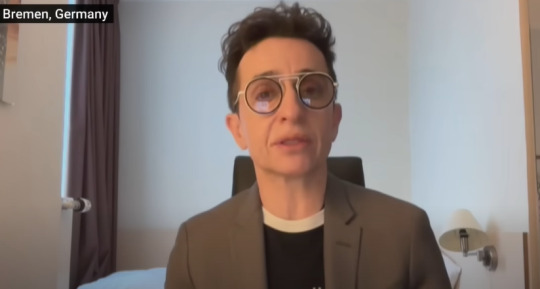
“The way memory politics functions in Europe, in the United States, but especially in Germany, the cornerstone is that the Holocaust was a singular event, standing outside of history. My argument is that in order to learn from history, we have to compare. That actually has to be a constant exercise. We are not smarter people, better people, or more educated people than the people who lived ninety years ago. The only thing that makes us different from those people is that in their imagination the Holocaust did not yet exist. In ours it does. We know that it’s possible. And the way to prevent it is to be vigilant in the way Hannah Arendt did in fact and other Jewish thinkers who survived the Holocaust. There was an entire conversation in the first two decades after World War Two in which they really talked about how to recognize the signs of sliding into the darkness. Our entire framework of international humanitarian law, it comes out of the Holocaust as does the concept of genocide. And I argue that that framework is based on the assumption that you are always looking at war, at conflict, at violence through the prism of the Holocaust. You always have to be asking the question of whether crimes against humanity, the definitions of which came out of the Holocaust, are occurring. Israel has waged an incredibly successful campaign of not only setting the Holocaust outside of history, but setting itself aside from the optics of international humanitarian law by weaponizing the politics of memory and the politics of the Holocaust.”
Masha Gessen, in an Interview on Democracy Now, 16 Dec 2023
#politics#hannah arendt#masha gessen#germany#holocaust#memory#israel#never forget#history#time#palestine#genocide#ghetto#liquidation#gaza#warsaw
10 notes
·
View notes
Text
There is an arrest warrant for Vladimir Putin by the International Criminal Court (ICC) for his genocide in Ukraine.
In limp retaliation, Russia has placed the judges of the ICC and journalists who have reported Russian war crimes on its own wanted list.
A journalist recently added to that list is Russian-American Masha Gessen.
Russia's Interior Ministry has added Russian-American journalist, writer, and outspoken Kremlin critic Masha Gessen to its wanted list. Gessen's name appeared on the ministry's list on December 8 without specifying what the journalist is wanted for. Media reports said earlier that a probe against Gessen was launched in late August on a charge of distributing "fake" information about Russia's armed forces. The charge stemmed from Gessen's interview with Russian journalist Yury Dud about alleged atrocities committed by Russian troops against civilians in Ukraine, the reports said.
In Russia these days, distributing "fake" information about Russia's armed forces actually means the opposite – reporting war crimes and genocide.
In 2017, Masha Gessen took part in a PBS Frontline series called "The Putin Files". Here is the extended version of Ms. Gessen's interview by Michael Kirk.
youtube
Here's an article at Literary Hub featuring an excerpt from Gessen's book The Man Without a Face: The Unlikely Rise of Vladimir Putin.
"A Small, Vengeful Man:" How Vladimir Putin Began His Iron-Fisted Reign
Masha Gessen Chronicles the Early Days of Putinism in Russia
#invasion of ukraine#vladimir putin#journalism#putin's attempts to control the media#genocide#putin is a war criminal#international criminal court#masha gessen#stand with ukraine#подавление свободной прессы#журналистика#маша гессен#россия#владимир путин#путин хуйло#международный уголовный суд#путин - военный преступник#союз постсоветских клептократических ватников#руки прочь от украины!#геть з україни#вторгнення оркостану в україну#деокупація#україна переможе#слава україні!#героям слава!
10 notes
·
View notes
Text
"The biggest difference between Gaza and the Jewish ghettos in Nazi-occupied Europe is that most Gazans are still alive and the world still has an opportunity to do something about it."
-Masha Gessen
6 notes
·
View notes
Text
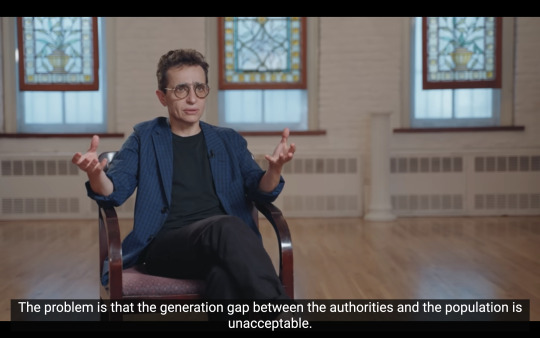

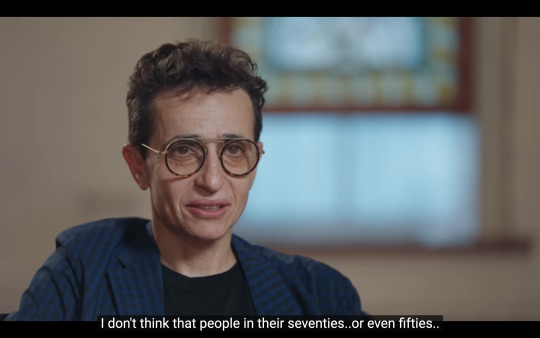


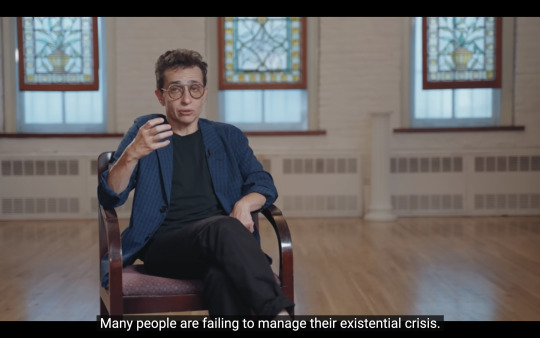



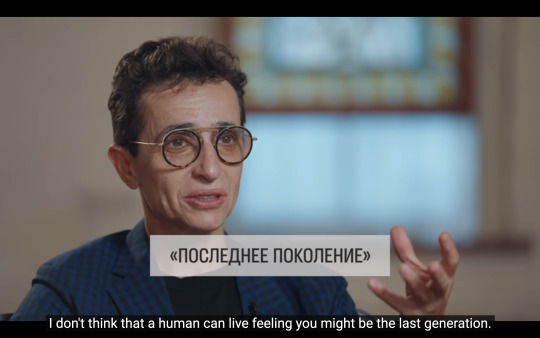
Masha Gessen in an interview with Yuri Dud
#masha gessen#climate change#yuri dud#вДудь#vdud#i've watched this part of the interview last night and finished it in its entirety just now#but i am still stuck on this small segment (which the link leads to)#they perfectly put how i feel and why#the existential horror and feeling that this is it#that i am going to be here for the final days#and seeing people around me go on with their lives as if people my age weren't facing down global collapse in our lifetime#i wouldn't be this worried at least not for myself if i were 50#20 more years is gonna be umcomfortable but probably doable#but 50? i don't want to be around for that#and that is just thinking of the climate crisis from my very lucky and privileged place of residence#i look at those younger than me and those still being born and i feel like screaming and crying#which is where my antinatalism comes in but how on earth are can anyone around#and consciously (while well aware of the crisis we are already experiencing) decide to reproduce condemning their children#it's like inside of me is one neverending scream of existential terror
10 notes
·
View notes
Text
Masha Gessen’s Hannah Arendt Prize has been canceled because of their essay on Gaza.
The German Green Party-affiliated Heinrich Böll Foundation, “in agreement with the Bremen Senate,” is withdrawing from awarding the Hannah Arendt Prize for Political Thought to the Russian-American journalist Masha Gessen, citing Gessen’s recent New Yorker essay “In the Shadow of the Holocaust” as the reason for the decision.
6 notes
·
View notes
Text
Highly recommend this essay on the politics of memory, the Holocaust, and the conflict in Israel and Palestine. It’s from the New Yorker and behind a paywall so I can’t share publicly but feel free to msg me and I’ll, er, see what I can do. Legally, of course. 😇

6 notes
·
View notes